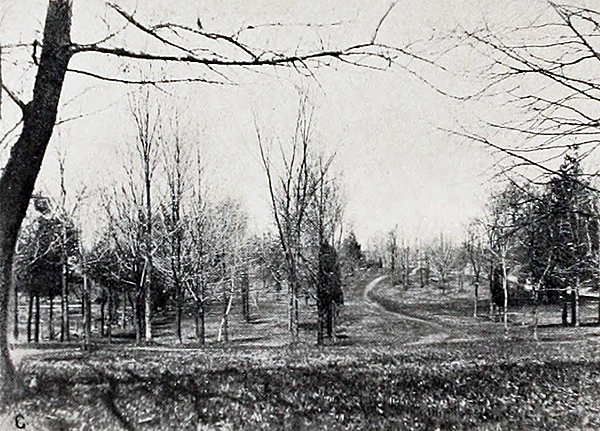Unconventional lawyer and author John Langdon Elwyn was the grandson of Governor John Langdon. Born near Bristol, England in 1801 while his parents were traveling abroad, John Elwyn studied at Harvard and lived most of his life in Portsmouth. According to The Portsmouth Guide Book of 1876 by Sarah Haven Foster, “he was a gentleman of some eccentricities, but a scholar of great acquirements, especially in history and philology.”

Near the end of his life, in 1867, John Elywn gave about five acres of land near the South Mill Pond to Portsmouth for the establishment of a public park. Nothing was done about the project, however, until 1875, when the Langdon Park Association organized.
Originally conceived as Elwyn Park, it officially opened as Langdon Park on May 25, 1876, after Portsmouth citizens had donated and planted more than six hundred trees.
 Speeches were made by Ichabod Goodwin, a former governor of N. H.; author Charles Levi Woodbury, son of former Governor Levi Woodbury; Reverend Alfred Langdon Elwyn, a relative of John Elwyn; and Reverend James DeNormandie, pastor of the Stone Church.
Speeches were made by Ichabod Goodwin, a former governor of N. H.; author Charles Levi Woodbury, son of former Governor Levi Woodbury; Reverend Alfred Langdon Elwyn, a relative of John Elwyn; and Reverend James DeNormandie, pastor of the Stone Church. John Elwyn did not attend the opening ceremonies. He had died in the mansion built by his great-uncle, Rockingham House, on January 30, 1876.
It is nearly impossible to determine where the photographer was standing when he captured the old photograph above. My best guess is on the north side of Lincoln Avenue, looking south towards South Street.
The park had been open for only tweny-six years when the picture appeared in C. S. Gurney's Portsmouth . . . Historic and Picturesque. More than a century later, Langdon Park continues to be a popular recreational spot. The city held its annual Easter Egg Hunt here one week after I took this picture.
The benches, markers, and flagpole in the center of my photograph surround a monument to the United States servicemen who were prisoners of war or missing in action during the Korean and Vietnam Wars.




No comments:
Post a Comment